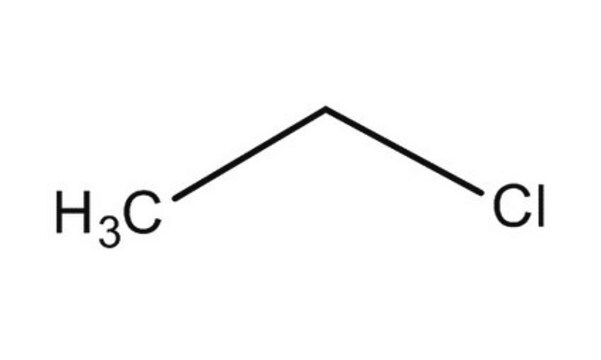338303
Chloroethane solution
2.0 M in tert-butyl methyl ether, anhydrous
Synonym(s):
Ethyl chloride
Sign Into View Organizational & Contract Pricing
All Photos(1)
About This Item
Empirical Formula (Hill Notation):
C2H5Cl
CAS Number:
Molecular Weight:
64.51
MDL number:
UNSPSC Code:
12352100
eCl@ss:
39050105
PubChem Substance ID:
NACRES:
NA.22
Recommended Products
grade
anhydrous
Quality Level
vapor density
2.22 (vs air)
vapor pressure
20.03 psi ( 55 °C)
5.98 psi ( 20 °C)
form
liquid
autoignition temp.
966 °F
concentration
2.0 M in tert-butyl methyl ether
impurities
<0.005% water
density
0.775 g/mL at 25 °C
functional group
alkyl halide
chloro
storage temp.
2-8°C
SMILES string
CCCl
InChI
1S/C2H5Cl/c1-2-3/h2H2,1H3
InChI key
HRYZWHHZPQKTII-UHFFFAOYSA-N
Looking for similar products? Visit Product Comparison Guide
General description
Chloroethane is an alkyl halide. Chloroethane (Ethyl chloride) adsorbed on Ag(111) at 100K has been studied using temperature programmed desorption, work function change, ultraviolet and X-ray photoelectron spectroscopy.
Application
- Green solvent in biomaterial extraction: Research highlights the use of Chloroethane as an effective solvent for extracting lignin-containing nanocellulose fibrils from date palm waste, emphasizing its potential in enhancing the sustainability of biomaterial processing (Raza et al., 2024).
Packaging
Supplied in a Sure/Pac™ cylinder and has a 1/4-turn bronze ball valve with a female 1/4" NPT outlet thread (Z122661) installed. Before using the cylinder, ensure that the valve is closed, then remove carbon steel plug that seals the outlet valve.
Compatible with the following:
Compatible with the following:
- Aldrich® Sure/Pac™ station for liquefied gases Z566446
- PTFE Sealing tape Z104388 or Z221880
- Straight septum-inlet adapter Z118141 with septa Z565687 or Z565695
Legal Information
Aldrich is a registered trademark of Sigma-Aldrich Co. LLC
Sure/Pac is a trademark of Sigma-Aldrich Co. LLC
Septum inlet adapter
Product No.
Description
Pricing
also commonly purchased with this product
Product No.
Description
Pricing
recommended
Product No.
Description
Pricing
signalword
Danger
hcodes
Hazard Classifications
Carc. 2 - Flam. Liq. 2 - Repr. 1B - Skin Irrit. 2
Storage Class
3 - Flammable liquids
wgk_germany
WGK 2
flash_point_f
-29.2 °F - closed cup
flash_point_c
-34 °C - closed cup
Choose from one of the most recent versions:
Already Own This Product?
Find documentation for the products that you have recently purchased in the Document Library.
Customers Also Viewed
Alkyl halide photochemistry on Ag (111): I. Ethyl chloride.
Zhou X-L and White JM.
Surface Science, 241(3), 244-258 (1991)
Andreas Tiehm et al.
Current opinion in biotechnology, 22(3), 415-421 (2011-03-08)
Because of a range of different industrial activities, sites contaminated with chloroethenes are a world-wide problem. Chloroethenes can be biodegraded by reductive dechlorination under anaerobic conditions as well as by oxidation under aerobic conditions. The tendency of chloroethenes to undergo
Daniil Polishchuk et al.
The Journal of bone and joint surgery. American volume, 94(2), 118-120 (2012-01-20)
Ethyl chloride topical anesthetic spray is labeled as nonsterile, yet it is widely used during injection procedures performed in an outpatient setting. The purpose of this study was to investigate the sterility of ethyl chloride topical anesthetic spray applied before
David J Steward
Paediatric anaesthesia, 22(3), 275-277 (2011-10-26)
Charles Robson (Figure 1) was born in New Westminster, British Columbia (now a suburb of Vancouver), in 1884 and graduated in medicine from McGill University in Montreal in 1913. Having interned and with some anesthesia training at the Royal Victoria
A Banerjee et al.
Journal of dentistry, 38(6), 475-479 (2010-03-13)
Compare clinical effectiveness of sodium bicarbonate and bioactive glass powders used for dental prophylaxis. 25 patients were allocated to either good or poor oral hygiene subgroups (n=50). Using a double-blind, split-mouth model, all patients underwent prophylaxis treatment on mandibular teeth;
Our team of scientists has experience in all areas of research including Life Science, Material Science, Chemical Synthesis, Chromatography, Analytical and many others.
Contact Technical Service









